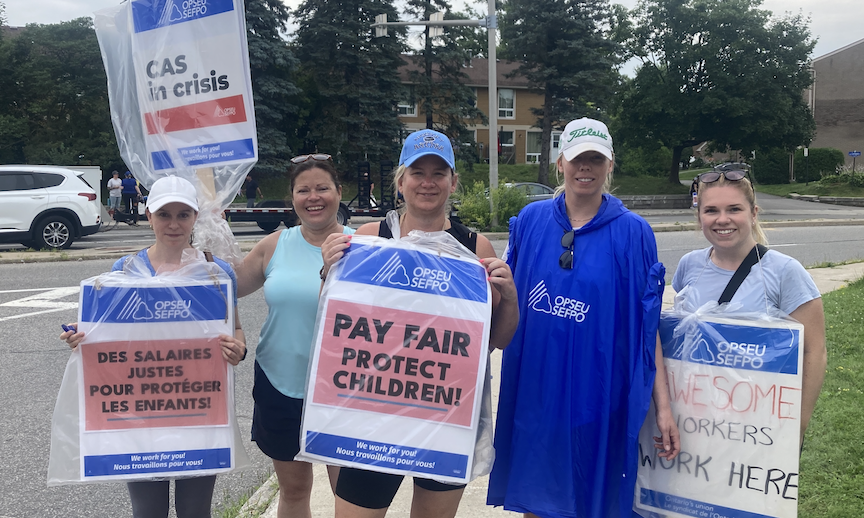Loud music, whistles and honks echoed around Telesat Crescent, Tuesday, where a strike by workers at the Children’s Aid Society of Ottawa entered its second day.
More picketers could be seen at the intersection of Blair and Meadowbrook.
CAS is part of the Ontario Public Service Employees Union (OPSEU). They are asking the Ontario Ministry of Children, Community and Social Services to stop layoffs and for better wages.
The parties failed to reach a collective agreement after nine months of bargaining, and when it came time for a strike vote in March, 85 per cent of the membership voted in favour.
Michele Thorn is an adoption worker and union president of OPSEU local 454. She said CAS used to have more than 400 workers in Ottawa. Now they have 320, and the province has said they intend to lay off another 20.
Thorn said the reduction in staff happened gradually over the years.
“They’ve done it more by attrition. People have left and they haven’t replaced them.”
Thorn says the ministry is controlling the CAS budget deficit by making cuts.
“The funding from the ministry keeps decreasing, but they keep adding expectations…so people are expected to do more with less workers to do it.”
Workers are already crumbling. After they’re done for the day they have no energy left for their own families, they often miss time with their own families because they’re doing overtime to try to keep up.
Michele Thorn, adoption worker and union president of OPSEU local 454
Thorn said CAS has seen a 30 per cent reduction in the number of children in care in the past five years which in turn has led to reduced funding, which she said has continued the deficits.
“The bargaining team for the union has been waiting for the employer to get back to us. We’ve had no communication from them, and they know we’re waiting.”
She says the job stress that CAS workers are already experiencing will only get worse if more people are laid off.
“Workers are already crumbling. After they’re done for the day they have no energy left for their own families, they often miss time with their own families because they’re doing overtime to try to keep up.
“They don’t have time. They’re doing bare bones work, cutting corners, they’re late getting things done, they have a list of things they have to do.”
This has led to a lower quality of service for those who rely on CAS services.
Thorn said the problem is bigger than CAS.
“(The government are) not funding other social services properly. So our families that we work with don’t have resources because there’s just not enough to go around. We used to be able to connect families with resources, and now we’re struggling even to do that,” Thorn said.
“We have workers … talking about going on leave. They’re burning out but they don’t want to leave because they know that when they do, they’re going to leave their work behind for people who are also already struggling.”
Thorn said the strike was a last resort.
Julia Dundas is a child and youth councillor for CAS. She said she is concerned about the people she works with.
“It’s really upsetting to be on strike because we’d much rather be working with our children and our families. I’m really worried about my families and my kids.”
“We need more funding. We need to be able to help out our kids and our families. They’re really suffering right now.”
Thorn said CAS workers find meaning in their work and they want to be able to give the best service they can to the community.
“People love their jobs. They love the work that they can do when they’re able to do it.”

